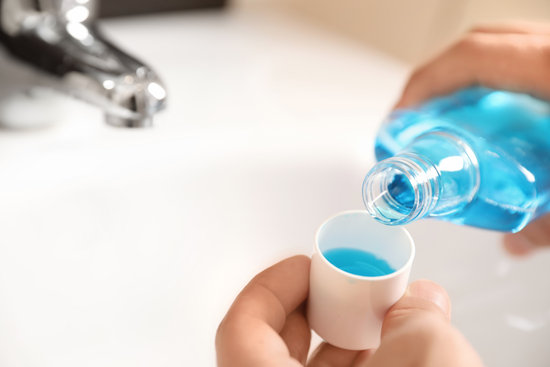 Every individual’s oral health needs are unique, so does the need for mouthwash. It is not just a solution for bad breath these days. From killing bacteria, controlling or preventing gingivitis, to getting rid of stains formed on the tooth surface, mouth rinse solutions can help in managing several oral health issues. Adding mouthwash in the regular oral hygiene routine can prove to be extremely beneficial. However, choosing the most suitable mouth rinse solution remains crucial.
Every individual’s oral health needs are unique, so does the need for mouthwash. It is not just a solution for bad breath these days. From killing bacteria, controlling or preventing gingivitis, to getting rid of stains formed on the tooth surface, mouth rinse solutions can help in managing several oral health issues. Adding mouthwash in the regular oral hygiene routine can prove to be extremely beneficial. However, choosing the most suitable mouth rinse solution remains crucial.
Different types of mouthwash
What is mouthwash? It’s an antiseptic liquid that cleans the mouth and freshens breath. Mouthwash solutions are categorized into two basic types, therapeutic and cosmetic.
The cosmetic options work like breath fresheners to control mouth odor. On the other hand, therapeutic ones can help in controlling dental plaque and decay prevention.
Mouth rinse liquids containing chlorhexidine and sodium fluoride are suitable to control dental decay and preventing gingivitis. Dentists often recommend the same to patients who show abnormal bacteria growth in the mouth. For individuals suffering from tooth sensitivity, mouthwash solutions containing potassium nitrate are best suitable. Benzydamine mouth rinse is prescribed for patients suffering from chemotherapy-related inflammation.
What are the benefits of mouthwash?
More than a dozen different oral rinses are available at most of the store shelves. All of them come with a different set of features and benefits.
-
Mouth rinse solutions for whitening
Highly pigmented food items containing berries, yellow spices, tomato sauce, and even wine or coffee can cause stains on the tooth enamel. These items, combined with cigarette smoking, can result in discolored, stained teeth. Unique whitening mouth rinsing solutions containing carbamide peroxide, hydrogen peroxide, etc. work as a shield for teeth and keep stains away.
-
The perfect solution for breath freshening
Medical conditions like acid reflux, plaque, bacteria, or even eating something laden in garlic or onion can result in bad breath. It can prove to be embarrassing, especially for individuals who remain socially active. In such a situation, breath freshening mouthwash quickly offers temporary relief.
-
Mouthwash to control plaque
Gum disease, often referred to as gingivitis, is the most common oral health concern faced by many. Plaque hardens and turns into tartar and results in irritation, gum bleeding, receding gums. To control the accumulation of plaque and get temporary relief, dentists recommend adding mouth rinsing in the daily oral hygiene routine.
-
Mouthwash for dry mouth
Side effects of medicines (including chemotherapy), smoking, and dehydration are some of the most common causes of dry mouth. Somehow, the mouth fails to produce enough saliva resulting in a dry mouth. It further causes problems in swallowing, chewing, and even speaking. Along with prescribing medication and suggesting changes in specific eating, drinking habits, your dentist may also recommend opting for special mouthwash to deal with dry mouth. Such solutions can offer temporary relief of up to four hours.
-
Alcohol-free solutions
Most of the mouth rinses contain ethanol that may cause a burning sensation, oral irritations, dryness, and other issues. To avoid these problems, dental care experts recommend alcohol-free mouthwash solutions. It’s perfect for kids who do not appreciate minty or intense flavors. Patients with alcohol abuse history, diabetes, Sjogren’s syndrome, cancer, dry mouth are often recommended these types of mouthwash solutions. It can offer great relief to people who have oral mucositis.
How many times should you use mouthwash?
Dentists recommend using antiseptic mouthwash at least once a day. However, there should be a gap of thirty minutes between brushing and mouth rinsing so that it won’t wash off the concentrated fluoride left after brushing. Best time to use mouthwash is post lunch.
What’s better when it comes to mouthwash vs. toothpaste?
As mentioned earlier, brushing cannot be replaced with mouthwash. The latter cannot be useful when it comes to getting rid of plaque, tartar layer quickly.
Modern dentistry has found solutions for decade old problems
The problem existed decades back as well, and records suggest people used a mixture of honey, spices, and herbs as a mint to control bad breath. Even legendary Roman Poet Publius Ovidius Naso (Ovid)’s work discusses problems that women faced due to bad breath during his era.
Some individuals face anxiety; they avoid being a part of social gathering and prefer to stand at a distance while speaking with someone just because of their bad breath problem. Thankfully, modern dentistry has helped in developing advanced solutions that resolve the issue once and for all. An experienced dentist can conduct a proper check-up and recommend the best options, including mouthwash, to treat bad breath.
If you are looking for a top-rated dental office in Roswell (GA) to discuss lousy breath issues and treatment for the same, you should consider fixing an appointment at the TruCare Dentistry.
